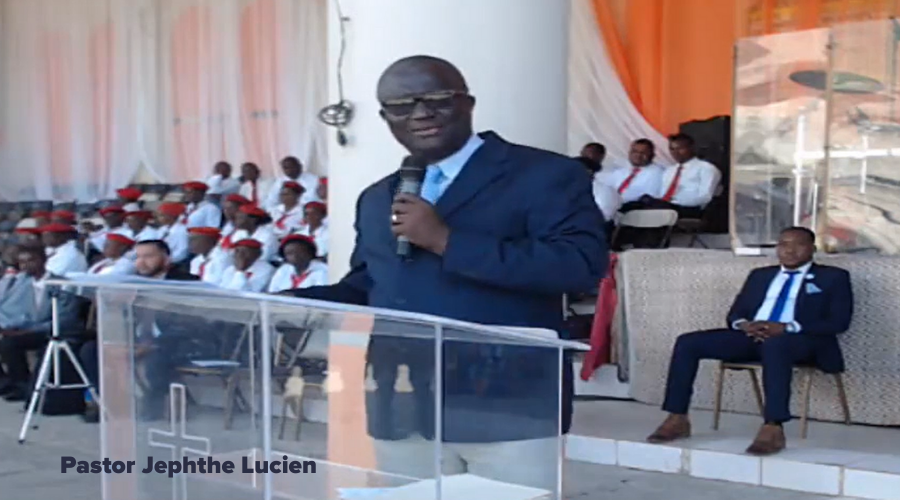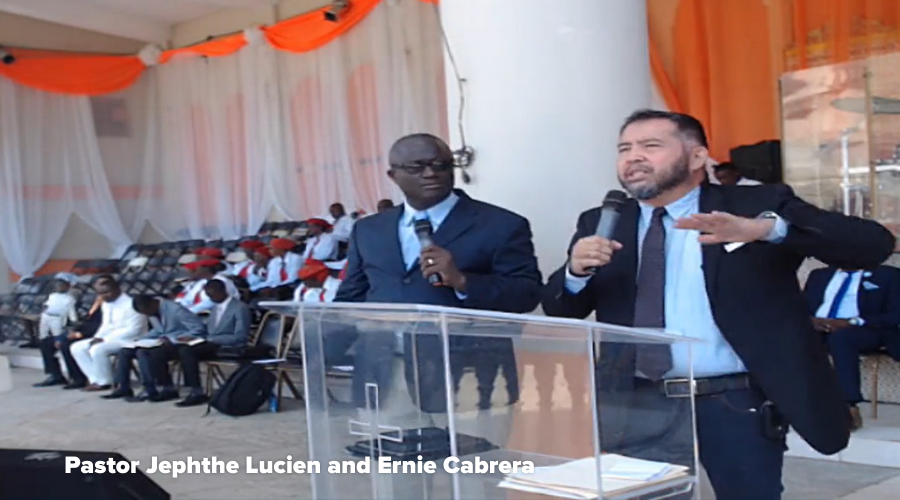
It was after midnight, or close to it. The heat of Haiti in July eases some as the night grows deepest across the humid hills and plains.
The pastor of Haiti’s largest church, Ecclesias Donatien, and several leaders from the Tabernacle of Praise are praying. They are praying with Jephthe Lucien, another of the country’s pastors, at Lucien’s home in Pignon, a town on a plateau in the center of Haiti.
Lucien and Donatien share a long relationship and deep faith amid different callings and contexts. Donatien, a charismatic personality, leads the largest church in Haiti. Lucien, a more private man, plants churches in villages, no matter how small or isolated.
Lucien’s father, Sidoine, started the Jerusalem Baptist Church in 1977. When that church grew, people planted a church. Then another and another and another and another.
“We built a big church in Pignon,” Lucien said of his family’s help from God. “But instead of working on filling the pews and bringing a lot of people in, I asked every group at the church to go to places where people are coming and use those places as a mission field. It was all the idea of just go out and do evangelism.”
Now, Lucien’s family has seen the Lord create the Jerusalem Baptist Mission, a network of 125 churches across Haiti. The network continues to grow, even though the family lost their beloved father and a brother, Enoch, last year.
Converge has a goal of planting 312 churches in five years across its 10 districts. A key factor in churches planting new churches is believing every church can start a new church.
Related: Church planting: How it looks different in 2021
“Jephthe has put into the DNA of all these churches that you’re not supposed to be a big church,” said Steve Storkel, a Converge global worker and a friend of the Lucien family for more than two decades. “You’re supposed to be a reproducing church. You’re supposed to be making disciples and planting churches.”
Growing up in the Lucien family
Learning to love the Lord and becoming a church planter might seem likely for one of Sidoine and Athénienne Sériphen Lucien’s 10 children. But it wasn’t that simple for Jephthe Lucien.
Growing up, he and all his siblings attended school 40 miles away from the church his dad pastored. His mom lived with the children. His family struggled financially for the most basic of needs, including food. Sidoine would sometimes walk 40 miles one way to bring the family food.
“Jephthe has put into the DNA of all these churches that you’re not supposed to be a big church. You’re supposed to be a reproducing church. You’re supposed to be making disciples and planting churches.”
At times in his life, Lucien was malnourished. At one point, he contracted tuberculosis. In his teenage years, Lucien wandered away from God’s will, struggling to follow Christ when he saw a faithful man of God not being able to feed his own children.
“I never wanted to be a pastor,” he said. “I didn’t see anything to desire since I was a victim of a father’s ministry where he dedicated his life to preach the gospel and I was the one who suffered because he couldn’t take care of us.”
But at 18 he was baptized, acting years later on his youthful commitment to follow Christ. Part of that was the deep faith of his parents: The family had morning devotions and evening devotions every day.
But, in truth, Jephthe says they were more like church services. Every devotion included singing, praying and dad teaching a Scripture lesson ― “20 minutes if we’re lucky,” he joked. All the children had an active role each day, reading a psalm or praying, for example.
Those devotions created deep faith, sustaining Lucien through some hard times. One time, he was crossing a flooding river valley on a motorcycle. While going through the river, he thought he was going to die as the currents nearly took him under. He said people nearby thought he was not going to make it as he struggled to get out of the flood-swollen river.
“(God) saved my life so I could be an instrument in his hands,” said Lucien of that moment in his youth. “That’s why I am who I am.”
Finding a focus for ministry
After his baptism and finishing high school, Lucien studied at Washington (D.C.) Bible College, then at Trinity Evangelical Divinity School in Illinois. But once his academic training for ministry ended in 1996, Lucien rejoined the Lord’s mission through his family in Haiti.
“I felt called to go to the middle of nowhere, to places where you get on a horse or donkey and it’s so hard to get there. I felt those were the places where God wanted me to go and reach out to people,” Lucien said. “The Lord sent me to everywhere there is no church and that’s where I felt that the devil was at work.”
For Lucien and others ministering in Haiti, there’s no shortage of satanic opposition.
Speaking of witch doctors, Lucien said, “That’s where people who don’t hear about God, who don’t know God really come to ― and they believe in the power of the devil.” Lucien noted it’s not that people are eagerly seeking Satan. Instead, they often have no access to doctors. Plus, they believe witch doctors may have the power to heal, send curses and remove spells that can cause sickness or death.
“I felt called to go to the middle of nowhere, to places where you get on a horse or donkey and it’s so hard to get there. I felt those were the places where God wanted me to go and reach out to people. The Lord sent me to everywhere there is no church and that’s where I felt that the devil was at work.”
Despite a powerful, pervasive awareness of evil, the Holy Spirit was working that night of prayer in Lucien’s house. Everyone could agree God was powerfully hearing their prayers.
But they didn’t anticipate one thing: Donatien’s death at the age of 89 just three days later.
Prayer is a tremendous legacy that Donatien helped stimulate at the church in the Cap-Haitien region, Storkel explained.
“The church was founded on prayer and worship. You can go there any time of the week and any time of the day and find people praying. That prayer is the foundation of the church,” Storkel said. “Haiti, more than most of the countries I’ve been to, has such a spiritual battle going on.”
It was not long after Donatien’s death the Converge church chose Lucien as its next pastor. God was working to answer the prayers in Lucien’s house and those of the Tabernacle of Praise, where 10,000 worshippers gather every Sunday. It is one of the largest churches in the entire Caribbean.
Storkel is quick to express the unique and significant call on Jephthe’s life: “God has used him tremendously to plant churches, to encourage churches.”
Still, to go from the country to the city, from a network of churches to such a large church reflects a major adjustment for Lucien. But one thing hasn’t changed: his deep embrace of Converge’s commitment to church planting so the Lord can keep creating gospel-preaching churches across Haiti.
“This is a church that is having a great impact,” he said of the Tabernacle. “I see them as a church that is going to reach out, not just to their immediate area but to the uttermost parts of the earth.”

Staying devoted to God’s priorities
Lucien understands the needs at the Tabernacle and in Haiti. He knows the poverty, the impacts of COVID-19 and the orphans. His mom and dad had more than 400 orphans come through their home in a lifetime of loving their neighbors.
That’s given him a special attachment to the poorest people of his country. Like his namesake in Judges 11, God has made Jephthe Lucien a man who can make an army for the Lord out of men who seem to have no value.
In Judges 11, Jephthe forms an army to fight Israel’s enemies from men the Bible says had no value.
“My dad, before he died, believed that I used men who weren’t educated, trained them and made powerful leaders out of them ― making soldiers for Christ.”
Currently, 43 pastors are partnered with Lucien so he can help them grow in their skills and serve the Lord faithfully. Lucien is using materials from The Timothy Initiative to train those pastors in a culture of making disciples and planting churches.
“I shared with people from Converge what I was doing, and they had a structured way of planting micro-churches (using TTI curricula),” he said. That’s why we’re working together ― so that we can continue to plant churches.”
That commitment to Biblical priorities won’t change for Lucien. He wants to see the thousands of worshippers who gather at Tabernacle of Praise learn to be disciple makers. And he wants to see the church focus on planting other churches.
“I shared with people from Converge what I was doing, and they had a structured way of planting micro-churches. That’s why we’re working together ― so that we can continue to plant churches.”
The new possibilities for the Converge churches are exactly in line with God’s vision, according to Ernie Cabrera, vice president of Church Partnerships for Converge MidAmerica, Southeast and Caribbean. He sees the Caribbean churches as partners who can start or strengthen churches and send missionaries just like every other district. In fact, people are already leaving the Caribbean to plant churches in South America.
“I see pastor Jephthe as a great leader,” Cabrera said. “We have to find the best leaders there. That’s the path I see the Lord leading us toward” so Caribbean churches keep growing stronger, keep starting new churches and keep sending missionaries.
Cabrera said what Tabernacle of Praise offers people is a paradigm shift. Haiti is a country with models for the church to become large. And Cabrera understands that. For a time in his own pastoral ministry, he dreamed of planting a large church. Over time, Cabrera learned that’s not always God’s goal.
“The goal is not to be large. But the goal is to multiply,” he said. “The goal is not to be a megachurch but to be a multiplying church. It’s good to be big if God allows you to be big, but the goal is to create disciples.”
How church plants unfold in Lucien’s setting
Storkel, who visits Lucien several times a year, has seen the church planting begin more than once.
One time, many people from the church were getting into the back of a grain truck in Pignon. It was evangelism week, so members of Lucien’s church were going to a village without a Bible-preaching church. Once the disciples arrive, they camp in the village with a little backpack for their personal needs and supplies.
The believers go home to home, door to door, building relationships and sharing the gospel Monday through Thursday. Then, on Friday the choir goes out and they hold evangelistic meetings and share the gospel.
“Many times, 100 people respond to Christ with salvation,” Storkel said. When Sunday comes, those people are baptized at a worship service. After that service, two pastors are left behind in the village to continue the ministry and plant a church.
“The first time I heard that, I thought of the book of Acts,” Storkel said. “It brought tears to my eyes and I thought, ‘This is the way it’s supposed to happen.’ The existing churches all know that their goal is to plant churches.”
Lucien explains the church members would share the gospel and people would get saved. Then the pastors who stayed behind and the new members would be nurtured in the Word, trained as leaders and develop a satellite church.
“People think of Haiti as a place that is needy, but the church is doing something significant there.”
“Every single leader knew (the church) was for the purpose of reproducing,” he notes. “And everywhere people got saved, people were trained, and new believers were nurtured, and new churches were planted.”
What stands out to Cabrera about the ministry is what Converge members around the world may be surprised to learn.
“People think of Haiti as a place that is needy, but the church is doing something significant there,” he said. There are at least 25 pastors who may affiliate with Converge through their partnership with Lucien. These partnerships would be on top of the Haitian Baptist Mission of churches and the Jerusalem Baptist Mission of churches that have already joined Converge.
Such partnerships mean more churches planting churches and more disciples being made. But these unions add to the diversity of Converge’s churches as well.
“There’s a true partnership we have. There’s no reason to join Converge unless they want to start, strengthen and send,” Cabrera said.

Joining what God is doing through Converge in Haiti
“Ask the Lord to keep me strong spiritually,” is Lucien’s simple request as he embraces a wider call from the Lord to impact Haiti for the gospel. “I have to face things that I never even thought about this past year. I need a lot of prayer,” he shared.
The father of two boys, 16 and 14, and his wife are eager to see them thrive. And there’s been a lot of grieving in the Lucien family: Jephthe’s mother and father, his brother and other relatives died in the last 18 months.
Related: Winds of the Holy Spirit
Meanwhile, Jephthe continues the Jerusalem Baptist Mission work while being pastor of Tabernacle of Praise. The mission headquarters is about three hours from Tabernacle of Praise, requiring the 56-year-old and his family to split their time each week between the two places.
“Pray the Lord would keep me strong physically and spiritually,” he asked. “Without the Lord’s help, it would have been very hard for me.”
One of the major works God may do at Tabernacle of Praise is help the church get a roof on its massive building. Those hot Haitian days leave the worshippers crowded into the shady spots to escape the humidity and sunlight.
For Lucien, the roof isn’t nearly as important as his mission from the Lord and the potential of the Tabernacle’s 10,000 worshippers to impact their neighborhood and the world.
“I think the Lord is using me to shape their understanding of the gospel, not to see deliverance just for themselves but to reach out to people and to go and share the gospel.”
Learn more about church planting or international ministry with Converge.